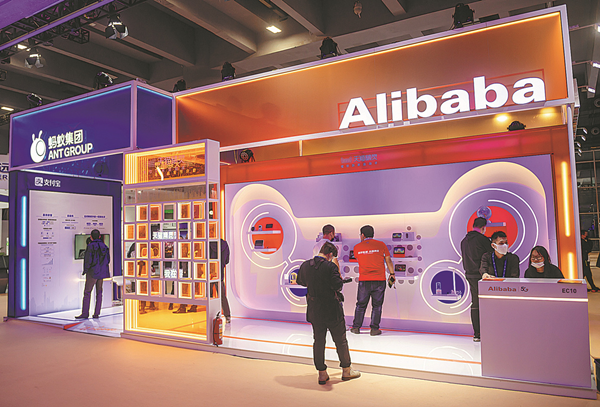Alibaba establishes beachhead in Spain

Visitors check out Alibaba's booth during a digital technology expo held in Guangzhou, Guangdong province. [Photo/China Daily]
Chinese tech heavyweight Alibaba Group Holding Ltd on Thursday launched new e-commerce platform Miravia in Spain in a move to grab a bigger share of the local midrange to high-end consumption market amid intensified competition from domestic rivals.
Miravia is operated independently, and products sold on the platform mainly feature Spanish and other European brands from a wide range of categories, such as beauty, fashion, personal care, electronics, foodstuffs, infant products and healthcare, Alibaba said.
Miravia, AliExpress and Lazada are three independent business segments under Alibaba. Lazada focuses on the e-commerce market in Southeast Asia, while AliExpress concentrates on cross-border online shopping.
"Spain is one of the European markets with the greatest potential in the e-commerce sector. It has a high penetration of internet and mobile technology, which is a huge potential for a mobile-driven platform like Miravia," said Yann Fontaine, CEO of Miravia.
"We hope to cover all the needs of Spanish consumers while offering local and international brands greater tools to sell and engage with their customers," Fontaine said. The platform also provides new users with promotional activities such as first order discounts and free delivery of goods exceeding 10 euros ($10.44).
Zhang Zhouping, a senior analyst of business-to-business and cross-border activities at the Internet Economy Institute, said Alibaba is stepping up efforts to explore overseas markets, and the launch of the new e-commerce platform targeting middle and high-income earners in Spain will help the company further learn about demand from Spanish consumers and better serve the local market.
The latest move is expected to cover different groups of shoppers and serves as a new experiment and business layout for Alibaba, Zhang said.
Last December, Alibaba restructured its business and created an international digital commerce unit, which includes foreign trade platforms like AliExpress, Alibaba.com and Lazada.
In its latest quarterly earnings, revenue from its international commerce segment reached 15.7 billion yuan ($2.2 billion) during the July-September period, up 4 percent year-on-year. The company said it will continue to strengthen capabilities in logistics and supply chains to serve the overseas consumer market.
"Chinese online retailers are accelerating their layout in overseas markets so as to obtain more users and seek new sources of revenue as growth in the domestic e-commerce sector is slowing," said Chen Tao, an analyst with internet consultancy Analysys in Beijing,
Chen said that although Alibaba has expanded its foothold in some European countries via AliExpress, which mainly sells cost-effective commodities, Miravia seems to adopt a differentiated strategy that mainly focuses on the mid-range and high-end market and places an emphasis on localized operations.
Other e-commerce platforms are investing heavily in boosting their global reach. Online discounter Pinduoduo Inc rolled out its cross-border e-commerce platform — Temu — targeting the US market, the company's first overseas destination, in September.
In addition, Chinese fast-fashion online retailer Shein is expanding its facilities in the US with plans to open two more distribution centers, which could help shorten delivery times to its customers by three to four days.
Known for its ultralow prices and a vast selection of fashionable clothing, Shein surpassed Amazon in app downloads on US mobile platforms for the first time in the second quarter, said mobile app data analytics firm Sensor Tower.
